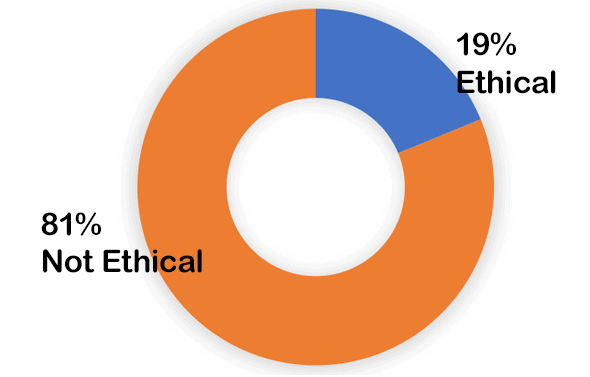This is the July 2020 edition of our monthly series of Ethics case studies titled What Do You Think? This series is comprised of case studies from NSPE archives, involving both real and hypothetical matters submitted by engineers, public officials and members of the public.
Your peers and the NSPE Board of Ethical Review have reviewed the facts of the case as shown below. And, here are the results.
Your opinion has been registered for the July 2020 edition of our monthly series of Ethics case studies titled What Do You Think?
Your vote is recorded as:

Want to know how your peers voted? We’ll send you an email with the poll results on July 28.
Your opinion has been registered for the July 2020 edition of our monthly series of Ethics case studies titled What Do You Think?
Your vote is recorded as:

Want to know how your peers voted? We’ll send you an email with the poll results on July 28.
A Review of the Facts
Engineer Ralph receives an unsolicited letter from a local, medium-sized general contractor. The contractor wishes to associate his firm with Ralph’s engineering firm, wherein he will refer clients to Ralph, and asks that Ralph refer clients to him. He states that he knows that it is not unethical for engineers to provide their clients with a list of a few qualified contractors. As an incentive to include his company on such list or as a referral to clients, the contractor is prepared to offer Ralph a flat $500, plus 3% of the total contract price as a finder’s fee/commission for every contract he signs as a result of Ralph’s referral. The contractor concludes by stating that his firm is fully licensed, insured, and registered with the Better Business Bureau and that he can provide a long list of satisfied clients.
Is it ethical for Ralph to associate with the contractor under the circumstances being proposed in this situation?
Here is the result of our survey of your peers:

Applicable NSPE Code References:
Code II.4.a: Engineers shall disclose all known or potential conflicts of interest that could influence or appear to influence their judgment or the quality of their services.
Code II.4.c: Engineers shall not solicit or accept financial or other valuable consideration, directly or indirectly, from outside agents in connection with the work for which they are responsible.
Code II.5.b: Engineers shall not offer, give, solicit, or receive, either directly or indirectly, any contribution to influence the award of a contract by public authority, or which may be reasonably construed by the public as having the effect or intent of influencing the awarding of a contract. They shall not offer any gift or other valuable consideration in order to secure work. They shall not pay a commission, percentage, or brokerage fee in order to secure work, except to a bona fide employee or bona fide established commercial or marketing agencies retained by them.
Code III.5.b: Engineers shall not accept commissions or allowances, directly or indirectly, from contractors or other parties dealing with clients or employers of the engineer in connection with work for which the engineer is responsible.
Discussion
It is essential that an engineer maintain an “arm’s length” relationship with contractors, vendors, etc. who have, or potentially have, contractual arrangements with the engineer’s employer or client. The Board considered this relationship in Case 81-4, in which three principals or employees of a consulting firm provided a list of recommended contractors to their developer clients. From time-to-time, at holidays or on birthdays, these contractors and vendors with whom the engineers dealt would give the engineers personal gifts of substantial value. Citing previous cases and language of the Code, the Board concluded there was a reasonable suspicion to others, and particularly to other contractors and suppliers, that acceptance of gifts by the engineers would imply favoritism. The Board determined that acceptances of gifts under these circumstances was unethical.
Case 83-5 addresses a similar situation, in which a landscape architect proposed to refer prospective clients to an engineer. The potential projects would have a limited amount of landscape architecture involvement and the engineer would compensate the landscape architect a fee over and above the fee the architect would normally receive for his services. The Board cited Code II.4, Code II.5 and Code II.5.b., and using these Codes and previous cases, we determined that an engineering firm may not ethically enter into a marketing agreement with an individual on a commission basis. While the case before the Board at this time is the reverse of 83-5, that is, the engineer is the marketer or referral agent, the same ethical concerns should apply.
Two primary issues are involved in the case before the Board: (1) Ralph making referrals to his clients and (2) receiving a commission for making referrals to his clients, and to others. Ralph’s referral to his clients is a definite conflict of interest due to the commission received. The contractor makes no suggestion that Ralph disclose to his client his conflict of interest as required by Code II.4.a. In addition, Code II.4.c. prohibits the receiving of commission or other valuables from a contractor; thus, the contractor’s proposal will be a violation of this Section. While Code II.5.b. addresses political contributions, a broad interpretation of the Section would indicate that an engineer receiving contributions (commissions) or other valuable considerations would also be a violation of the Code.
The Ethical Review Board’s Conclusion

It would be unethical for Ralph to associate with the contractor under the circumstances being proposed in this situation.
BOARD OF ETHICAL REVIEW
William A. Cox, Jr., P.E., James G. Fuller, P.E., Donald L. Hiatte, P.E., Robert L. Nichols, P.E., William E. Norris, P.E., Jimmy H. Smith, Ph.D., P.E., William W. Middleton, P.E., Chairman
Note: The Board of Ethical Review operates on an “ad hoc” educational basis, and does not engage in resolving disputes of fact between parties in actual cases. That function is left to the state society if members are involved in judging whether a member has violated the Code of Ethics. Being solely educational, the function of the Board is to take the submission of “facts” as the basis for analysis and opinion without attempting to obtain rebuttal or comment from other parties. On that basis, the reader of the opinions should always recognize that the Board of Ethical Review is not an adjudicatory body, and unless indicated otherwise, its opinions are not binding upon the National Society of Professional Engineers, any state engineering society or any individual. Instead, the opinions represent the opinions of licensed engineers as to the reasonable standards of practice within the engineering profession. Board of Ethical Review opinions are intended to provide guidance in actual cases only to the extent of the “facts”, stated in the case. Cases may be reproduced for educational purposes as long as the material reproduced provides appropriate attribution to NSPE and the Board of Ethical Review.








Your scenario does not match the discussion
You did not say that the engineer was responsible for the work and you did not say it was for a public entity
So the way it was presented is not a conflict if the engineer is not responsible for the job